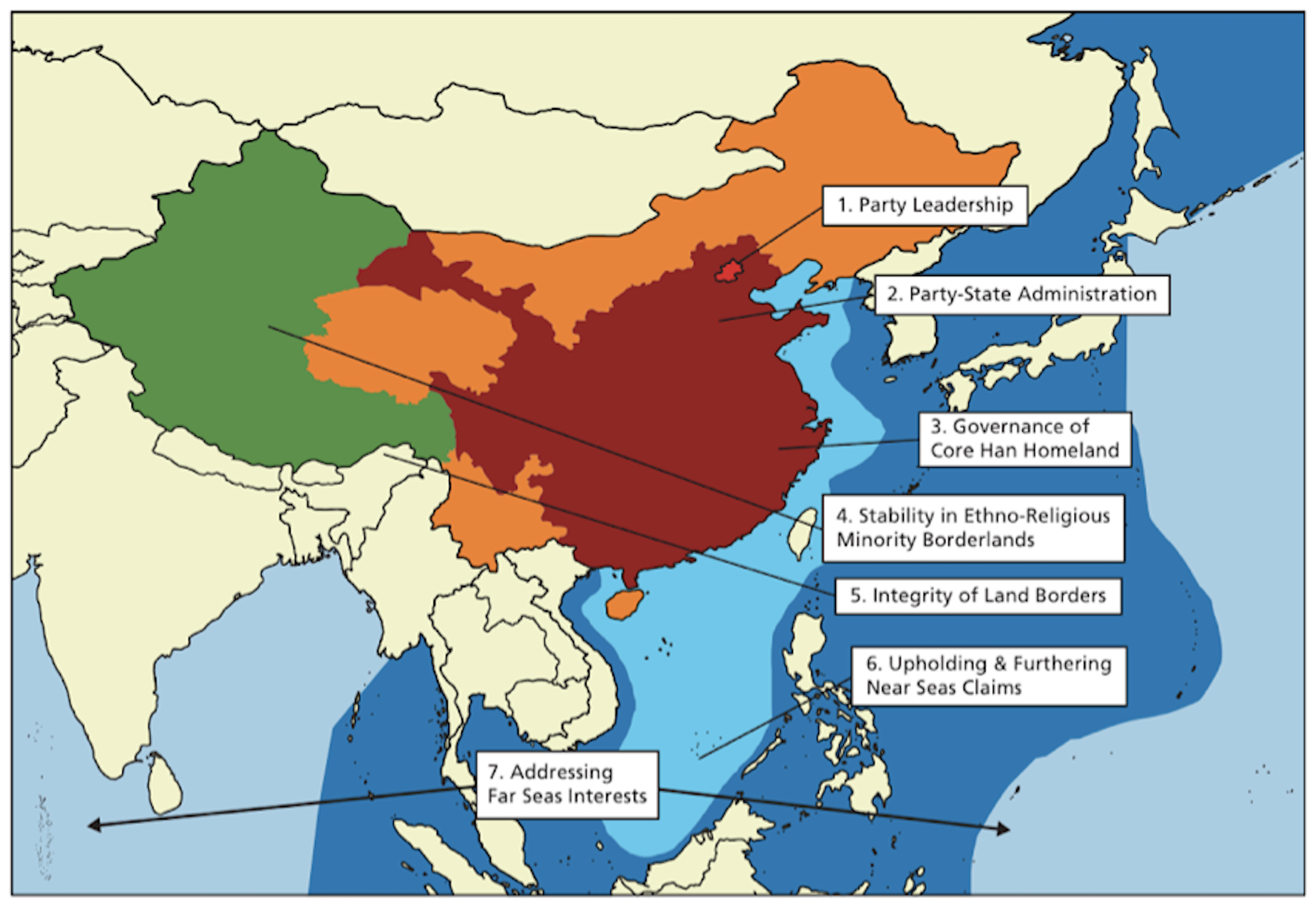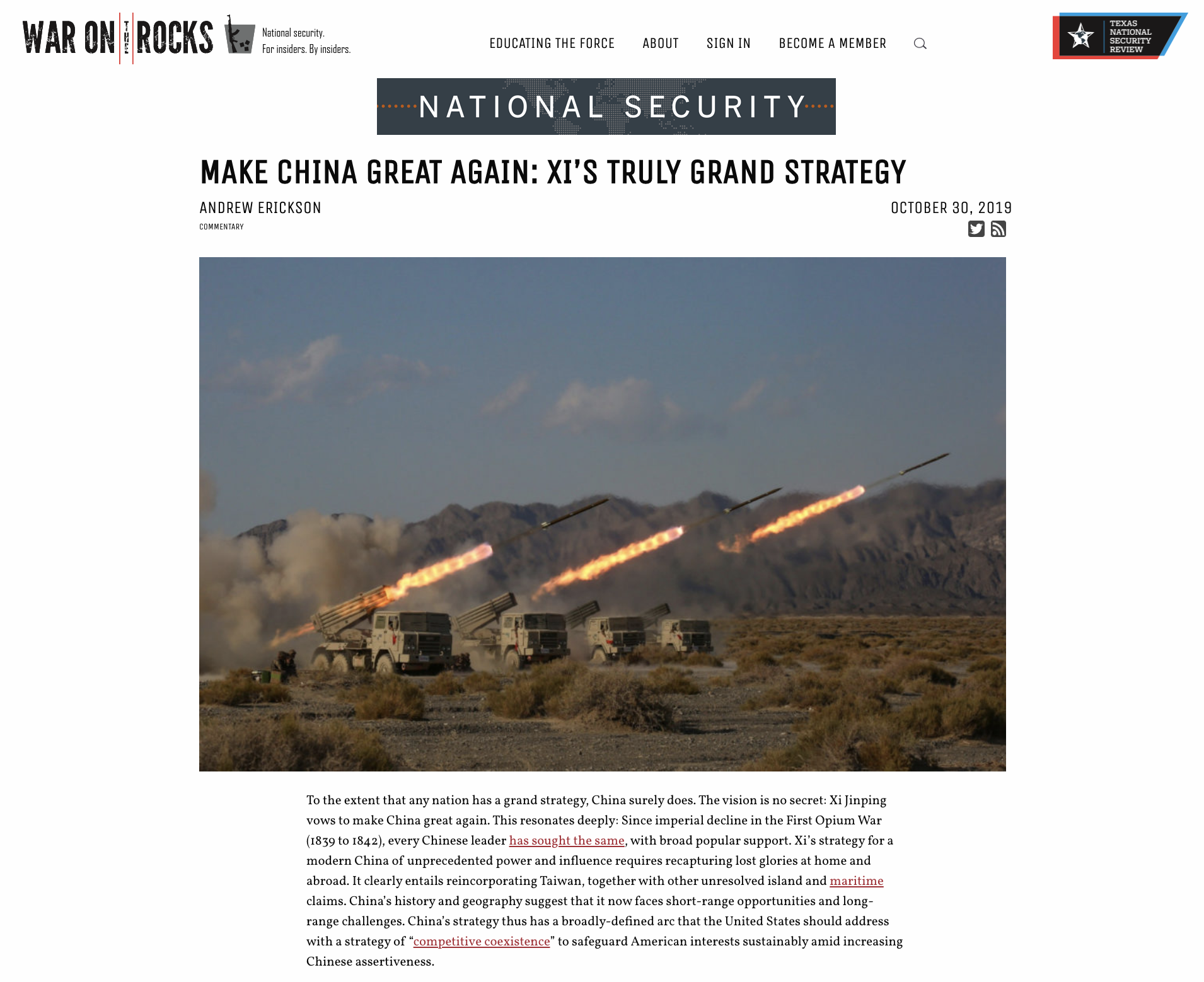Make China Great Again: Xi’s Truly Grand Strategy
Here I argue that that the People’s Republic of China under Xi has the grandest, most strategic vision of any great power today. Beijing’s strategy has a broadly-defined arc that Washington should address with its own strategy of pursuing “competitive coexistence” to safeguard American interests sustainably amid increasing PRC assertiveness.
Andrew S. Erickson, “Make China Great Again: Xi’s Truly Grand Strategy,” War on the Rocks, 30 October 2019.
- Republished via RealClearDefense and RealClearWorld.
To the extent that any nation has a grand strategy, China surely does. The vision is no secret: Xi Jinping vows to make China great again. This resonates deeply: Since imperial decline in the First Opium War (1839 to 1842), every Chinese leader has sought the same, with broad popular support. Xi’s strategy for a modern China of unprecedented power and influence requires recapturing lost glories at home and abroad. It clearly entails reincorporating Taiwan, together with other unresolved island and maritime claims. China’s history and geography suggest that it now faces short-range opportunities and long-range challenges. China’s strategy thus has a broadly-defined arc that the United States should address with a strategy of “competitive coexistence” to safeguard American interests sustainably amid increasing Chinese assertiveness.

“Figure 4.1: China’s Hierarchy of National Security Priorities,” in “China,” in Thierry Balzacq, Peter Dombrowski, and Simon Reich, eds., Comparative Grand Strategy: A Framework and Cases (Oxford, UK: Oxford University Press, 2019), 79.
Xi’s Vision and Priorities
At the 19th Chinese Communist Party National Congress on Oct. 18, 2017, Xi Jinping delivered a major speech in which he declared, “The Chinese nation […] has stood up, grown rich, and is becoming strong.” He articulated a new era with the historic mission to “realize the Chinese Dream of national rejuvenation.” For its implementation, Xi laid out a timeline with three major target dates: By the Party Centenary in 2021, China should “finish building a moderately prosperous society in all respects.” By 2035, China should be much stronger economically and technologically, have become a “global leader in innovation,” and have completed its military modernization. By the People’s Republic of China Centenary in 2049, China should have “[r]esolv[ed] the Taiwan question” and be a “strong country” with “world-class forces.” Party leadership is crucial to the realization of this “Chinese Dream,” Xi insists, and his own leadership is crucial for now.
To understand how Xi’s grand strategy might play out, and to assess its prospects, one should consider Xi’s hierarchy of geographically-rooted national security priorities. Save for the party’s self-justified dictatorship since 1949, this hierarchy arguably echoes across centuries of Chinese imperial history. From their very origins, the party (established 1921) and its People’s Liberation Army (established 1927) have pursued political, security, and geostrategic goals in layers. Overall, these objectives have radiated outward over time, prompting leadership to look beyond China’s borders. When facing setbacks, however, leaders have retreated inward in focus and forces. Should China or its leadership face substantial challenges in the future, they might slow or even reverse their current outward advance. The speed and direction cannot be projected with certainty, but the broad continuum along which China’s geostrategic status may progress or retrogress is readily visible. In descending order of importance: party leadership, centralized administration of the core Han heartland, stability of ethno-religious borderlands, integrity of land borders and security of coastlines, resolution of near-seas sovereignty claims, and safeguarding of overseas interests. The party has staked its claim to power on its ability to safeguard the most important of these interests and rejuvenate China in a way that no other government could. … … …






































